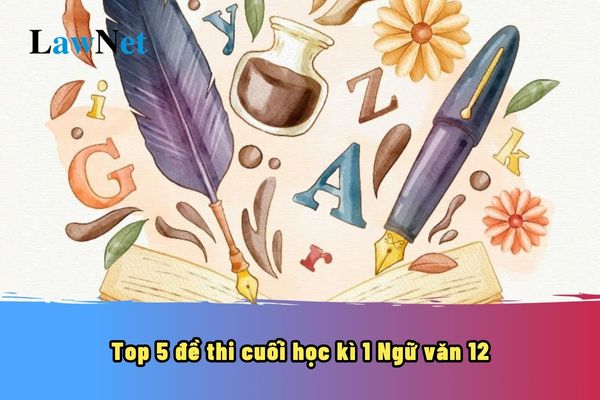Vietnam: What are the Top 5 1st end-of-semester question papers for 12th-grade Literature for the 2024- 2025 school year? Does the literary knowledge in the 12th-grade Literature curriculum include modern lyrical poetry?
What are the Top 5 1st end-of-semester question papers for 12th-grade Literature in Vietnam for the 2024- 2025 school year?
Students can refer to the following Top 5 1st end-of-semester question papers for 12th-grade Literature in Vietnam for the 2024- 2025 school year:
Download 1st end-of-semester question paper for 12th-grade Literature No. 1
Download 1st end-of-semester question paper for 12th-grade Literature No. 2
Download 1st end-of-semester question paper for 12th-grade Literature No. 3
Download 1st end-of-semester question paper for 12th-grade Literature No. 4
Download 1st end-of-semester question paper for 12th-grade Literature No. 5
*Note: Information is for reference only./.

What are the Top 5 1st end-of-semester question papers for 12th-grade Literature for the 2024- 2025 school year? Does the literary knowledge in the 12th-grade Literature curriculum in Vietnam include modern lyrical poetry? (Image from the Internet)
Does the literary knowledge in the 12th-grade Literature curriculum in Vietnam include modern lyrical poetry?
Under subsection 2 of Section 5 in the General education program in Literature issued in conjunction with Circular 32/2018/TT-BGDDT, the literary knowledge in the 12th-grade Literature curriculum in Vietnam includes:
- The cognitive, educational, and aesthetic functions of literature
- The alignment between theme, ideology, and dominant inspiration
- Some expressions of artistic style in folk literature, medieval literature, modern literature, and trends of realism and romanticism; artistic style of authors
- Some elements of legendary tales, novels (modern and postmodern), modern lyrical poetry, comedy, and memoirs
+ Legendary tales: themes, characters, language, artistic techniques; evaluating the role of fantastical elements in legendary tales, relating to the role of these elements in folk tales
+ Novels (modern and postmodern): language, psychological developments, actions of characters
+ Modern lyrical poetry: language, imagery, symbols, symbolic and surreal elements
+ Comedy: language, characters, situations, satirical techniques
+ Reportage, diaries, or memoirs: non-fiction nature, description, narration; combination of realistic details, and events with the writer's experience, attitude, and evaluation
- Psychological development of characters and the methods of expressing character psychology by the authors
- The relationship between the narrator and the viewpoint in conveying the theme of the text
- Basic understanding of Ho Chi Minh that aids in comprehending some of his notable works
- Brief history of literature and the role of foundational knowledge about literary history in comprehending texts.
Thus, according to the above guidelines, students will study modern lyrical poetry in the 12th-grade Literature curriculum.
What are the prohibited acts for 12th-grade students in Vietnam when attending school?
Under Article 37 of the lower secondary school, upper secondary school and multi-level school charter issued with Circular 32/2020/TT-BGDDT, the prohibited acts for lower and upper secondary school students include:
1. Disrespect the dignity, honor or bodily integrity of teachers, officials and staff of their schools, other people and other students.
2. Act dishonestly in learning, examinations or admission process.
3. Buy, sell or use alcohol, tobacco, drugs, other stimulants, firecrackers or explosives.
4. Use mobile phones and other devices in class for purposes other than learning and without the teacher's permission.
5. Fight or disrupt public or school order or security.
6. Use or exchange cultural products that incite violence or contain indecent materials; use toys or play games that impede their own healthy development.
7. Students shall not commit other prohibited acts provided for by regulations of law.
In addition, 12th-grade students must also comply with 11 duties when attending school under Article 34 of the lower secondary school, upper secondary school and multi-level school charter issued with Circular 32/2020/TT-BGDDT, including:
- Learn and train according to curricula and education plans of their schools.
- Respect their parents, officials, teachers and staff of their schools, and those older than them; maintain solidarity and mutual support in learning and training; conform to the charter and rules of their schools; and abide by the law.
- Take exercises and maintain personal hygiene.
- Participate in group activities of their schools and classes, Ho Chi Minh Young Pioneer Organization and Ho Chi Minh Communist Youth Union; help their families, join physical and social activities and environmental protection activities, and maintain traffic order and safety.
- Protect school and public property; contribute to fostering, preservation and enhancement of school traditions.
Additionally, 12th-grade students are entitled to the following rights when attending school under Article 35 of the lower secondary school, upper secondary school and multi-level school charter issued with Circular 32/2020/TT-BGDDT:
- Receive comprehensive education with fairness, be provided with time, facilities, hygiene and safety to learn in class and self-learn at home, be informed of their education and training, and be able to use learning, cultural and sport equipment of their schools as per the law.
- Receive respect, protection and fair and democratic treatment, complain to their schools and education authorities about decisions concerning themselves; transfer school with legitimate reason as per existing regulations; enter school before the compulsory starting age, skip a grade and study at an age higher than the compulsory attendance age according to regulations in Article 33 of Circular 32/2020/TT-BGDDT.
- Participate in activities for development of their gifts in academic subjects, sports and art organized by their schools if able to.
- Students eligible for social benefits, disadvantaged students and gifted students may receive sponsorship or other benefits as per the law.
- Transfer school if eligible according to regulations following school transfer procedures stipulated by the Minister of Education and Training.
- Enjoy other rights as per the law.

